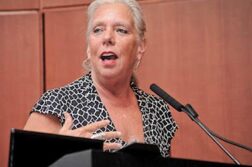BY A SAD COINCIDENCE, two prominent pioneers of gay theatre who shared the same surname died within weeks of each other. Lanford Wilson died on March 24 at age 73 at his home in Sag Harbor, Long Island, survived by half-brothers and a stepsister. Doric Wilson died on May 7 at age 72 at his home in Manhattan, leaving no survivors.
Both playwrights got their start at Caffe Cino, one of the earliest Off-Off-Broadway venues and later one of the decisive forces in contemporary gay theatre. Located on Cornelia Street in Greenwich Village, Caffe Cino was founded by Joe Cino in 1958 and lasted for almost a decade. Initially, it offered play and poetry readings, coffee, and conversation in an intimate setting. Its first documented production, in December, 1958, was Dorothy Parker’s one-act play, “Well, Here We Are!” Most early shows were drawn from classical or well-established Broadway or Off-Broadway fare.
All that changed in 1961 when Doric Wilson’s one-act play “And He Made Her” was performed at Caffe Cino. A satire on Adam and Eve, it featured gay angels, one of whom was a gay activist and the other a “supper club sophisticate,” in the words a New York Blade review of a 2007 revival. A year later, Lanford Wilson arrived in New York. His one-act play “The Madness of Lady Bright” recounts drag queen Leslie Bright’s loneliness and horror at growing old. It ran for 205 performances in 1964, put Caffe Cino on the map, and prepared the way for other gay-themed plays. Lanford Wilson wrote close to fifty full-length and one-act plays. Ten of his early plays were produced at Caffe Cino, but within several years he was working mostly at LaMama E.T.C., also in the Village, because the stage was larger and better equipped for full-length plays. (LaMama’s founder Ellen Stewart, herself a major force in shaping Off-Off-Broadway, died at age 91, in January 2011.)
Both Doric Wilson and Lanford Wilson were associated with the Off and Off-Off Broadway production agency Albarwild (also known as the Barr/Wilder/Albee Playwright’s Unit), co-founded in 1965 by Edward Albee and theatrical producers Richard Barr and Clinton Wilder. It was staffed primarily by gay theatre professionals and nurtured works by up-and-coming playwrights, many of whom were gay.
Lanford Wilson was born in 1937 in Lebanon, Missouri, a town that figured in several of his plays, including the 1980 Pulitzer-winning central play of the Talley trilogy, “Talley’s Folly.” As a teenager, he saw local productions of “Death of a Salesman” and “Brigadoon,” which he saw as life-changing events. He attended state colleges in Missouri and California and moved to Chicago in 1957. By day he was a graphic designer at an advertising agency, and by night he wrote short stories. While taking a play-writing course at the University of Chicago, he discovered his talent for writing dialogue.
In 1969, Lanford Wilson was one of the founders of the Circle Repertory Theatre (which closed in 1996), consisting of an ensemble of artists teaching voice, movement, and scene study, working together to create plays. In the words of Lanford Wilson’s Playbill.com obituary, “it was an influential Off-Broadway hothouse of talent.” The atmosphere was ideal for Wilson, who loathed working alone. He wrote “Fifth of July” entirely at the Circle Rep. Five different full drafts were given readings over several months in 1978, and then it moved to Broadway, where it ran for 511 performances. Winner of almost all awards that a playwright could receive, Wilson was, in the words of Gay & Lesbian Literary Heritage, “an openly gay man successful in mainstream theater.”
Doric Wilson was born in 1939 in L.A., grew up on a ranch in Washington, and started acting in the first grade. He attended the University of Washington, Seattle, where he studied drama before moving to New York in the late 1950’s, and returned to Seattle for several years in the 80’s to care for his elderly mother, who had marched with him in New York’s 1974 Gay Pride Parade. He was always in love with theater: his obituary in Gay City News quotes him as saying, “The wonderful words, the laughter, the impossible made magic by the ringing of a bell –– that’s what I remember most. I remember everything but the dates.”
A civil rights and political activist, he participated in the Stonewall Riots (and was featured in the 2010 documentary Stonewall Uprising). His 1983 play Street Theater which has been revived several times, is a satire—as are most of his plays—based on the riots. He was the author of over a dozen plays, one of which, the political satire The West Street Gang, was first produced in 1977 at the Spike Bar on Eleventh Avenue, where he also worked as a bartender and manager. The play featured characters modeled after those Wilson had encountered at the bar, but when those patrons had to defend themselves against gay bashers, his characters upended the expected stereotypes. His plays, usually reviewed outside the mainstream press, were not always well-received.
In 1974, Doric Wilson co-founded tosos (The Other Side of Silence). It was one of the first professional theatre companies to feature explicitly gay-themed new plays and revivals by such writers as Joe Orton, Terrence McNally, and Lanford Wilson. Its first home was the Basement Theater on Church Street in SoHo. It closed in 1979 but was reborn as tosos ii in 2001 and is still active. In Doric Wilson’s obituary in Playbill.com, writer Felice Picano noted: “He was one of the earliest, and one of best, playwrights to treat GLBT life as it was actually lived, rather than as a problem to be solved.” At the time of his death, he was working on his last play, Boy Next Door, a comedy about an about an aging porn star, which also featured an Off-Off-Broadway playwright based, in part, on an old Caffe Cino and tosos colleague, Robert Patrick.
Martha E. Stone is the literary editor of this magazine, as well as a frequent contributor.




